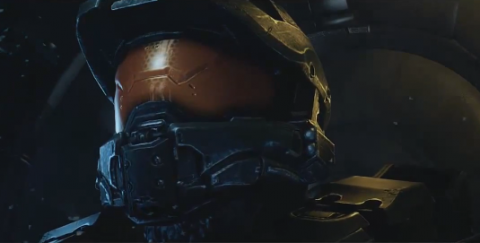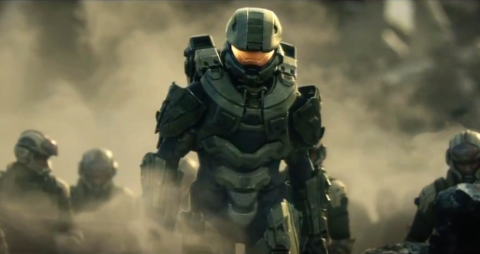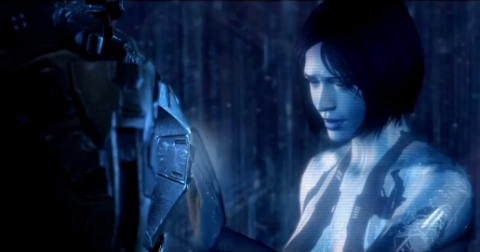The Man in Green Power Armour
By gamer_152 17 Comments
Note: The following post contains spoilers for the entirety of the Halo series, including the ending of Halo 4. You have been warned.
So, the Halo 4 story has a lot of problems. The Chief still isn’t the deepest or most expressive character, the story doesn’t always do a great job of explaining itself, the plot-dump midway through from the Librarian feels a little inelegant and like a lot to take in at once, the Didact feels a little too Saturday morning cartoon villain for my tastes, and given that that Halo 1-3 was largely focused around stopping the Human-Covenant War, the almost immediate return of the Covenant in 4 feels like a bit of a cop-out. That being said, I think in many parts of the internet, there’s been a lack of focus on the strengths of Halo 4’s story, and how the events of Halo 4, if used correctly, really have the potential to positively shape the coming games.
The Stoic Hero

The obvious problem that has existed with the Master Chief as a character is the same one that has plagued many video game characters over the years, and indeed seems to be representative of a traditional problem with game narratives on the whole; It’s empowering to be the Chief, he comes across as a badass, he’s an iconic figure, but he goes through basically no character development, and has no real depth or personality beyond being a strong, silent killing machine. This often gives him a rather epic feel, but doesn’t make him particularly interesting to follow as a person.
Now, that’s not to say you can’t tell interesting stories about an emotionally devoid soldier, you can, but I think the best ways to do that involve exploring the origins and implications of the character being such a thing, and portraying it in at least a somewhat negative light, and that’s never been something the games have been particularly interested in. The Chief’s origins have remained rather untouched by the games, while the fact that the Chief is lacking humanity and solely purposed for war is something that the games have either shown an outright indifference to, or shown in a positive light as they build up the Chief’s “badass” image.
Outside of problems with the character of the Chief himself, the circumstances he finds himself in always seem to turn out a little too perfect for him. We’ve seen things slightly shaken up before, with him temporarily losing Cortana at the end of Halo 2, or ending up drifting through space at the end of Halo 3, but neither of these seemed like things that bothered him all that much. A character has to go through both triumph and turmoil to make their journey meaningful, and it seems that the Chief has gotten far more of one of these than the other. In fact, when the Chief doesn’t care about much in the world but getting his missions done, it’s hard for the writers to really create any situation in which it feels like he’s experiencing something negative.
Don’t get me wrong, I love Halo, and I feel a strong attachment to the Chief, but let’s be realistic, he’s not the best video game character ever. Halo 4 however, starts to show at least a glimmer of change, and a slight promise of some of the deep-rooted problems with the Chief being solved. A large part of this can be seen in the opening of the game, a scene in which a UNSC official starts to interrogate Catherine Halsey, creator of the Spartans, on the program which created the Chief and the Spartans like him.
Green and Blue

History is often remembered as being a lot simpler and a lot more black-and-white than was actually the reality, and this is certainly shown to be the case with the Spartan program. While the Spartans are remembered as heroes and the tools by which the Human-Covenant War was ended, their origins were actually far more questionable, with them having been originally developed as a means to try and quell a human civil war. Here, for the first time we see a kind of moral ambiguity that just hasn’t reared its head in the Halo games to date.
We also see a Halo story which starts to suggest that maybe the emotional detachment of the Chief and Spartans like him, from other human beings, is a bad thing, in fact the officer interrogating Halsey points out that it’s downright sociopathic. After putting these elements into play I wish the game as a whole touched on them a little more, but with the way it’s been set up, I’d be surprised if we didn’t come back to them in later instalments.
When we return to the Master Chief and Cortana, the two are more or less the same people we’ve always known, but at the start of Halo 4’s second mission we see them both start to change as we learn of Cortana’s rampancy, and her inevitable death. This is by no means the first time Cortana has been in peril; after her aforementioned loss to the Gravemind at the conclusion of the second game, the Chief set out to save Cortana, believing she could play a vital role in stopping the Human-Covenant War. There the Chief proved to be right and was successful in his mission, but Halo 4 does something clever by presenting almost the same situation, only turned on its head.
Once again, Cortana is in danger, and once again, against the judgement of someone in some ways superior to himself (Cortana herself), the Chief refuses to accept defeat and insists on saving her, but the situation surrounding him is entirely different. This isn’t presented as an act of good faith and judgement on the Chief’s part, but instead appears somewhat futile. He starts bumping up against the hard rules of the Halo universe, and when Cortana is telling you you’re wrong about something, then there’s not a whole lot of chance you’re right.
The Chief’s Loss

At the conclusion of Halo 4, the Chief doesn’t end up with anything close to his previous idealised victories. He manages to stop the Didact, but for the first time in a Halo game, the Chief’s success comes at a significant cost to him. This time there’s bad with the good, and the Chief isn't just proven wrong about being able to save the person he worked so hard to help, but in the end it’s not even up to him whether she’s saved or not. He is disempowered, and far from coming out of the struggle with everything intact, he’s left in just about the worse position possible, as he’s lost the only other person he’s ever really had any strong connection with.
Not only does this give us a moment to see the Chief briefly display the kind of emotion that we never usually see from him, but more importantly post-Cortana’s death something she said still weighs heavily on his mind; that he may be more of a machine than a man. This is the same point that was touched on in the opening when the officer discussed the sociopathic tendencies of the Spartans, and throughout the game, as the rampant computer program Cortana ironically appeared more emotive than the human she was tied to, the Chief.
It’s all really going to depend how 343 play this over the next game or two, but if done right, this worry in Chief’s head could be the catalyst for a journey in which he and the characters around him explore his lack of emotion as a negative aspect of his character, and if handled especially well could lead to the transformation of the Chief into someone more human. The legendary ending seems to mirror this idea, as the last moment we see of the game involves us literally being shown a small part of the human Chief under the armour for the first time.
Duder, It’s Over
In all honestly, I’m not entirely convinced that 343 can make all the changes necessary to turn the Chief into a compelling character, and I understand that the worries of many people that the death of Cortana may lead to less emotive characters in the series and not more, but if they can pull this off correctly, the events of Halo 4 might be just what the series needed. Either way, as critical as I can get, I still believe the Halo canon is interesting, and I still have great fun with the games. Thanks for reading, and here’s hoping that 343 will do right with the upcoming instalments.